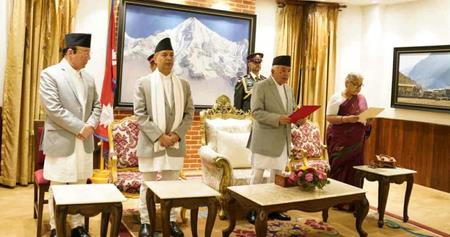Nepal President Calls For Support To Hold Elections After Criticism Over House Dissolution
Dissolution of the lower house was a key demand of the Zen-G protestors amid the impression that current members of the parliament are involved in corrupt practices. As per the recommendation of newly-appointed Prime Minister Sushila Karki, the house was dissolved, ensuring a premature death after formation in 2022.
Issuing a press statement on Saturday evening, President Poudel said that a peaceful way-out has been achieved in an extremely difficult and frightening situation, terming it an opportunity made possible because of tactful intervention.
“The Constitution and parliamentary system have been preserved, and the federal democratic republic remains intact,” he said, while calling all sides to sincerely utilise this hard-won opportunity and work together in holding the elections scheduled for March.
Earlier in the day, eight political parties represented in the now-dissolved House of Representatives, expressed their disagreement over the dissolution of the house stating that it was against democratic principles while terming the decision unconstitutional.
“It is against Article 76 (7) of the constitution, precedents set by the Supreme Court and constitutional tradition,” the eight political parties said in a joint statement.“Such unconstitutional cannot be acceptable for us.”
Among the parties that condemned the house dissolution are: Nepali Congress, Communist Party of Nepal (United Marxist-Leninist) or CPN (UML), CPN (Maoist Centre), CPN (Unified Socialist), Janata Samajbadi Party, Janamat Party, Loktantrik Samajbadi Party, and Nagarik Unmukti Party.
With the Gen-Z protestors insisting on dissolution of the house, the negotiation between its leaders, Nepal President and Nepal Army was prolonged because major political parties were also lobbying for continuation of the lower house.
Some leaders of Gen-Z protestors were telling the media that they could not step back from the demand of house dissolution.
There was also debate whether to appoint a new Prime Minister or dissolve the lower house first. The GenZ leaders were insisting on dissolution of the house first before the appointment of a new Prime Minister. After the President Poudel, who is also preserver of constitution, raised the issue of constitutional basis without recommendation from the Prime Minister, consensus was reached to make appointment of Prime Minister first and the new Prime Minister would make recommendation for dissolving the parliament. Then, following the appointment of Karki as Prime Minister on Friday night, the house was dissolved around midnight.
A Nepali digital newspaper, meanwhile, quoted the newly-appointed Prime Minister Karki as saying:“The President had been saying that Parliament cannot be dissolved without the Prime Minister's recommendation. In the end, the President was also ready to dissolve it first. All the documents were ready. Since the house was going to be dissolved anyway, it seemed to me that whether it happened earlier or later didn't make any difference.”

Legal Disclaimer:
MENAFN provides the
information “as is” without warranty of any kind. We do not accept
any responsibility or liability for the accuracy, content, images,
videos, licenses, completeness, legality, or reliability of the information
contained in this article. If you have any complaints or copyright
issues related to this article, kindly contact the provider above.
Most popular stories
Market Research

- What Does The Europe Cryptocurrency Market Report Reveal For 2025?
- United States Kosher Food Market Long-Term Growth & Forecast Outlook 20252033
- Utila Triples Valuation In Six Months As Stablecoin Infrastructure Demand Triggers $22M Extension Round
- Meme Coin Little Pepe Raises Above $24M In Presale With Over 39,000 Holders
- FBS Analysis Highlights How Political Shifts Are Redefining The Next Altcoin Rally
- 1Inch Becomes First Swap Provider Relaunched On OKX Wallet






















Comments
No comment